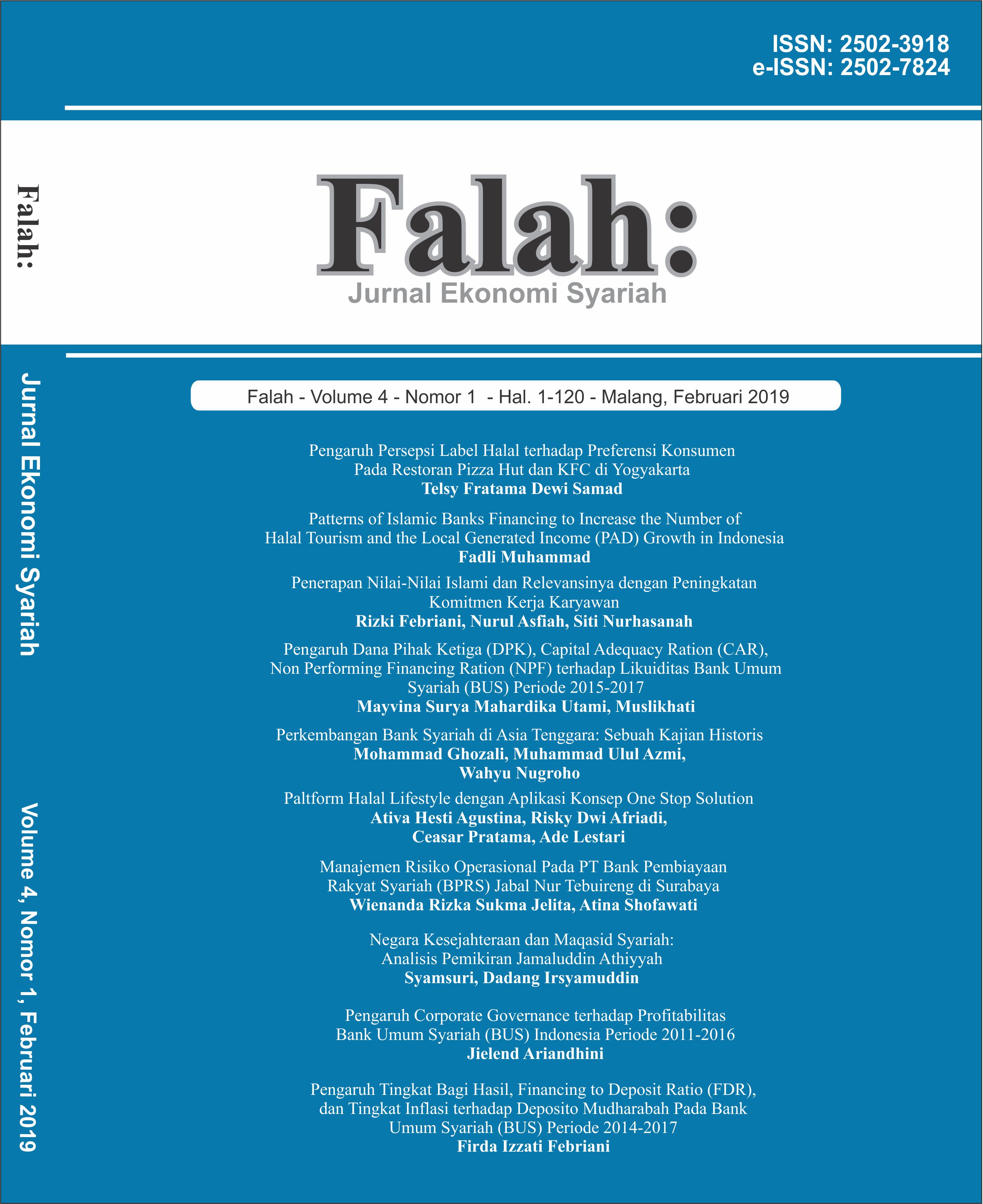Pengaruh Persepsi Label Halal Terhadap Preferensi Konsumen pada Restoran Pizza Hut dan KFC di Yogyakarta
DOI:
https://doi.org/10.22219/jes.v4i1.7960Keywords:
Halal Label, Perception, Preference, Consumers.Abstract
Halal label has an important role to make consumers recognize easily the quality of products, especially to Muslim consumers. It has enhanced the image of products’s cleaness, purity, and no harm. The non-Muslims are also give positif feedback about halal label. This study aims to determine the consumers’ perseption of halal label, the effect perception of halal label on consumers purchasing preference at the Pizza Hut and KFC Restaurant. Determine whether there are differences in consumers' perception of halal label based on gender, religion, educational background, and income. Determine whether there are differences of influence on halal label perception based on gender, religion, education background and income to consumer preferences. This research is quantitative with 200 sample respondents Pizza Hut and KFC, simple random sampling method. The data collection using a likert scale questionaire. Data were analized using Correlation Analysis, Different T-test & F-test (Anova), and Analisis Multivariat Analysis Varians (Manova). The result found that overall average level of respondents's perception of halal label positif and has significant effect on the preferences. Then the result of analysis differences perseption found that there are significant differences between the consumers’ perseption of halal label based on gender, religion, educational background, while based income level, did not occur significantly different. The result analysis in effect, discover that there were significant differences influent perception of halal label on the characteristics of the consumers purchasing preferences: gender, religion, educational background, and income.Downloads
References
Aris Setyawan Prima Sandi, dkk, “Persepsi Label Halal Terhadap Keputusan Pembelian Konsumen Pada Produk Minuman Berenergi”, Jurnal Manajemen Bisnis, Volume 1 No. 0, Tahun 2011, hal. 10-12
Asadollah Kordnaeij dkk, “Studying Affecting Factors on Customers’s Attitude Toward Product with Halal Brand”, International Research Journal of Applied and Basic Sciences, Vol.4, No. 10, Tahun 2013, hal. 313-314
Endang Soesilowati, “Business Opportunities for Halal Products in The Global Market: Muslim Consumer Behaviour and Halal Food Consumption”, Journal of Indonesian Social Science and Humanity, Vol.3, Tahun 2010, hal. 151-160
Faryal Salman dan Kamaran Siddiqui, “An Exploratory Study for Measuring Consumers Awareness and Perception Towards Halal Food in Pakistan”, Interdiciplinary Journal of Contemporary Research in Business”, Vol.3, No.2, Tahun 2011, hal. 639-649
Wan Melissa Wan Hassan dan Khairil Wahidin Awang, “Halal Food in New Zealand Restorant: An Exploratory Study”, International Journal of Economic and Manajement, Vol. 3, No.2, Tahun 2009, hal 385-402
Books
Assael & Henry. 1992. Consumer Behavior and Marketing Action. Fourth Edition. New Jersey: Prentice Hall
Bambang Prasetyo dan Lina Miftahul Jannah. 2005. Metode Penelitian Kuantitatif: Teori dan Aplikasi. Jakarta: Raja Grafindo Persada
Hansen, M.R., N. Nohria, & T. Tierney. 1999. What's Your Strategy for Managin Knowledge. Inggris: Harvard Business Review
Hartono. 2013. SPSS 16.0: Analisis Data Statistika dan Penelitian. (Yogyakarta: Pustaka Pelajar
Anto, Hendrie. 2003. Pengantar Ekonomika Mikro Islami. Yogyakarta: EKONISIA
Khaf, Monzer. 1992. Theory of Consumption. dalam Tahir, Sayyed (et al, ed), Reading in Micro economics: an Islamic Perspective, (Longman Malaysian Sdn. Bhd)
Siregar, Syofian. 2013. Metode Penelitian Kuantitatif: Dilengkapi dengan Perbandingan Perhitungan Manual dan SPSS. Jakarta: Kencana
Sopa. 2013. Sertifikasi Halal Majelis Ulama Indonesia: Studi atas Fatwa Halal MUI terhadap Produk Makanan, Obat-obatan dan Kosmetika. Jakarta: GP Press
Sutisna. 2002. Perilaku Konsumen dan Komunikasi Pemasaran. (Bandung: PT Remaja Rosdakarya
Website
http://www.pizzahutfranchise.com/about-best-pizza-franchise.php
http://www.kfcfranchise.com/about-KFC-fried-chicken-business.php
http://id.wikipedia.org/wiki/KFC
http://www.halalmui.org/images/stories/pdf/LSH/produkhalal.pdf
http://www.islampos.com/restoran-tanpa-sertifikat-halal-81426/
Downloads
Published
How to Cite
Issue
Section
License
Authors who publish with this journal agree to the following terms:- Authors retain copyright and grant the journal right of first publication with the work simultaneously licensed under a Creative Commons Attribution License that allows others to share the work with an acknowledgement of the work's authorship and initial publication in this journal.
- Authors are able to enter into separate, additional contractual arrangements for the non-exclusive distribution of the journal's published version of the work (e.g., post it to an institutional repository or publish it in a book), with an acknowledgement of its initial publication in this journal.
- Authors are permitted and encouraged to post their work online (e.g., in institutional repositories or on their website) prior to and during the submission process, as it can lead to productive exchanges, as well as earlier and greater citation of published work (See The Effect of Open Access).

This work is licensed under a Creative Commons Attribution-ShareAlike 4.0 International License.


















